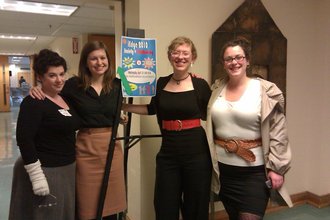Amazon Kindle and Education

(with Althea Lazzaro, Freeda Brook, and Caroline Conley: Winter 2010, Spring 2010).
Deliverables: research paper and conference presentation
Primary skills developed: collaboration, presentation, application of critical thinking to technology's place in society, understanding of information literacy.
--
Description & Significance:
As part of LIS 550 (Information in Social Contexts), a group of colleagues and I applied critical thinking to the stakeholders, context, and outcomes of a trial using Amazon's Kindle in several higher-education facilities around the country. By piecing together various perspectives using interviews, reports, and deduction, we were able to hone in on several of the key factors and implications of the trial.
Questions surrounding how we learn and teach, and the effectiveness of various methods for integrating technology into these processes, are not only germane to the current state of librarianship, but clamoring to be answered. As we learn more about how learning and literacy occur, there are widespread implications for areas such as copyright, where much thought still needs to be given to revising our policies in ways that make sense for digital media. By presenting our findings at the 2010 iEdge conference (hosted by the UW's chapter of ASIS&T), we were able to bring our concerns and questions to a larger group, and further conversation on topics with which we, as future participants in the field, must continue to consider deeply. It is these arenas for discussion and development of ideas that make me excited and confident I have chosen a worthwhile and engaged field to pursue.
Deliverables: research paper and conference presentation
Primary skills developed: collaboration, presentation, application of critical thinking to technology's place in society, understanding of information literacy.
--
Description & Significance:
As part of LIS 550 (Information in Social Contexts), a group of colleagues and I applied critical thinking to the stakeholders, context, and outcomes of a trial using Amazon's Kindle in several higher-education facilities around the country. By piecing together various perspectives using interviews, reports, and deduction, we were able to hone in on several of the key factors and implications of the trial.
Questions surrounding how we learn and teach, and the effectiveness of various methods for integrating technology into these processes, are not only germane to the current state of librarianship, but clamoring to be answered. As we learn more about how learning and literacy occur, there are widespread implications for areas such as copyright, where much thought still needs to be given to revising our policies in ways that make sense for digital media. By presenting our findings at the 2010 iEdge conference (hosted by the UW's chapter of ASIS&T), we were able to bring our concerns and questions to a larger group, and further conversation on topics with which we, as future participants in the field, must continue to consider deeply. It is these arenas for discussion and development of ideas that make me excited and confident I have chosen a worthwhile and engaged field to pursue.
